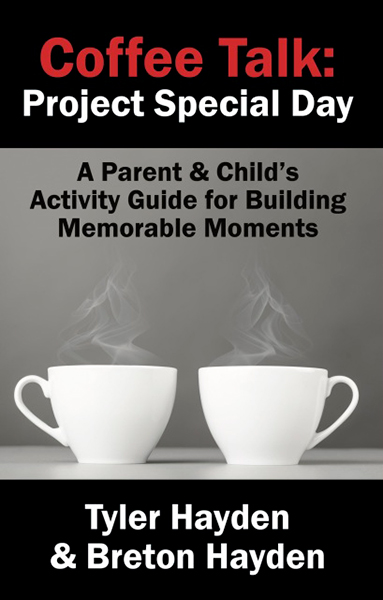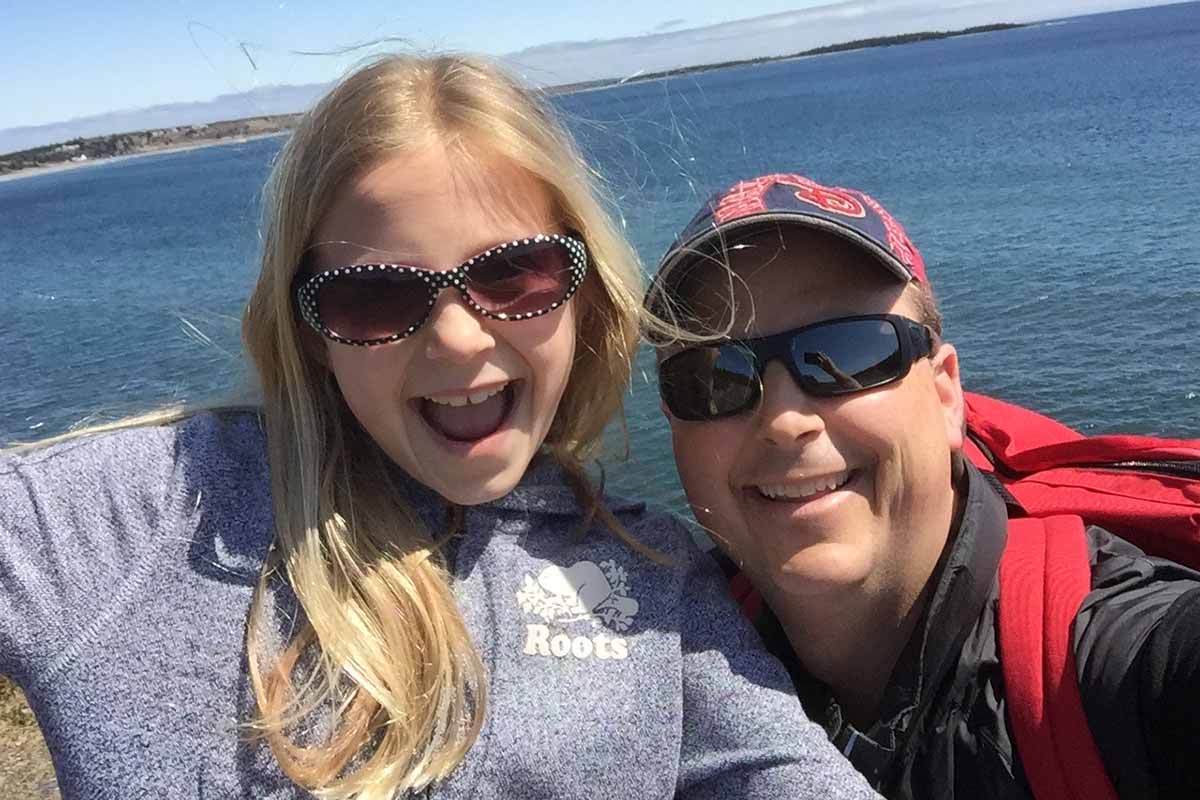Tyler and Breton Hayden turn their Special Day Project activities into a book for parents and their children
By Suzanne Rent
Tyler is a motivational keynote speaker in Lunenburg whose areas of expertise are work-life balance and teambuilding. He’s written 16 books, including a series called Coffee Talk.
But Tyler has one team member with whom he created a unique project. Tyler and his daughter, Breton, often spent special days together when Tyler had to do errands. They’d go out for coffee or tea. They’d ask each other questions during trips into the city. One day while riding an elevator in a building in downtown Halifax, they decided to ride other elevators in other buildings, and judge each one to find out which one was fastest, cleanest, coolest, and had the best view.
Tyler and Breton put their games and activities into a book, Coffee Talk: Special Project Day, A Parent and Child’s Activity Guide for Building Memorable Moments.
The book includes three sections.
• Coffee Talk includes fascinating questions parents and kids can ask each other.
• Would You Rather focuses on a game in which kids and parents ask each other questions starting with “would you rather”.
• The final section is Dates on the Go, a list of activities parents and kids can do together.
Tyler, what did you learn about Breton through the activities and writing the book?
I learned that Breton is an absolutely imaginative and brilliant young woman, who is an absolute driving force for any project. She has driven this project even so far as when I was in Ottawa during the book launch. I had a keynote to do, but my plane was delayed and Breton looked at her mother and said, “No problem, Mom, I’ve got the book launch.” She had an agenda. She had a game. She had everything sorted out. She was ready to run with it. We were talking about marketing, sales, publication dates, editing. She was tooth and nail involved in the entire project. She was a bear to work with, a wonderful bear. But she really pushed the project forward.
Breton, what did you learn about your Dad?
Breton: I learned through a lot of questions that I didn’t know about him. I learned about how fast he is at typing.
Tyler, are some of the experiences in this book similar to the teambuilding experiences in your other books?
Coffee Talk is a game we play with teams. Getting people to connect and share what they are all about, but also the idea that people being a team and building those intact partnerships and mentorships. A lot of this is about how the parent mentors a child, how do they share their experiences. Breton and I did a lot of that. It was a fantastic way to get to know one another.
How do these activities make people better parents?
Tyler: At the end of the day, they always say quality time. Finding ways to do that in a creative and interesting way. I think the activities do that. They are very simple, low cost, low sweat. Pick up the book and off you go. I really started to build the memories. One parent who purchased the book to play with her daughters, her daughters actually pulled the book out of her hand when they got home and she overheard her kids play the game “Would You Rather” with each other in the living room. Little did we know it was a great way to connect siblings.
And there is no age limit on this? You can use this with older kids and teenagers?
Tyler: Absolutely. I think you kind of have ages five and up. It’s more of a perspective for school age kids and up. I had one client play with their adult children and they had a great time. The coffee talk questions are “Which schoolteacher would make the best zombie?” “Which schoolteacher would you dress up as for Halloween?” That kind of stuff is not really age dependent.

Did both of you have favourite questions or activities?
Breton: My favourite question from Coffee Talk was probably, “Who do you think could survive a zombie apocalypse?”
Tyler: She picks all the good questions! I think mine was Dates on the Go. It’s not really a question, but some of the dates and the ideas of things we’ve done are fun to do. The book’s byline is creating memorable moments and that’s what I remember. Going to the parks, being on the swings, writing our names in the sand at the beach. For me, it’s not a question, but it’s about the things we’ve done.
And all of those things you mentioned are low cost or free.
Tyler: Yes. People try to reinvent the wheel. The kids remember the fact you were there for them when they were sick. They remember the quirkiest, weirdest things, like a song you used to sing. It could have been just the one time. It’s not the trip to Disney, although I like the trips to Disney, don’t get me wrong. It’s the little things like going to the grocery store and always getting a cookie. It’s those little things that matter at the end of the day.
Breton: One of my favourite things I probably remember my dad doing with me was when we were playing cards and we were at hockey and my dad decided to teach me to play Go Fish. I said, “OK, I will learn how to play go fish.” And what do you know? I win.
Tyler: And she wins ever since, too.
If parents wanted to do this themselves, how do they start?
Tyler: The best way is to pick up our book and find something in the pages to do. The other way is to really follow the traits of your child. I think Breton is very linguistic, so that’s why she came up with cool questions. Making yourself available to be open to having the experience. Too often we get caught up looking at our devices and having to take that text or that call. Put them in your pocket; you don’t need those. Be open to what’s happening around you. The brilliance is Breton is the driving force behind this. She’s the one who really built the idea of Special Project Day. To be open to what they give you. You have to carve out the time and make sure you protect that and make it a regular thing.
And these are activities you can do on the go.
Tyler: Would You Rather was played while we were driving somewhere. They are called ambulators in the teambuilding world. Ambulators are games and activities you can play from place to place. Other games we’d play we’d start off with the alphabet and then pick a topic like fruit and go through the list of the alphabet and come up with a word that started with that letter and make it all the way to Z. Or we’d come up with counting games.
What skills do you think kids get from these exercises?
Tyler: I think they get a lot of creative thinking skills. I don’t think it’s the skills, but the memories they get. It’s the connection that’s so important. When kids become teenagers, when kids become parents of their own, young adults. It’s memories of that time, that authentic experience they have with another human, that’s so important. They feel grounded, they feel safe, they feel loved. It’s the laughter, the sense of adventure.
Do you think it helps keep the dialogue open between kids and parents, especially in times when more serious questions come up?
Tyler: Yes, I think so. Kids go through that quirky teenage phase where they go into themselves or connect with their friends. This sets the table for communication and sets the table for being connected, and that’s the key to keep them busy. A busy kid through
arts or sports helps to build well-rounded and amazing young people.
What do you want people to know about the book and what you learned?
Tyler: What I want to see is children and parents bonding more with the book or even just bonding without the book. Making sure that when they move off to college they still are pretty much connected and can look back on all those memories.






